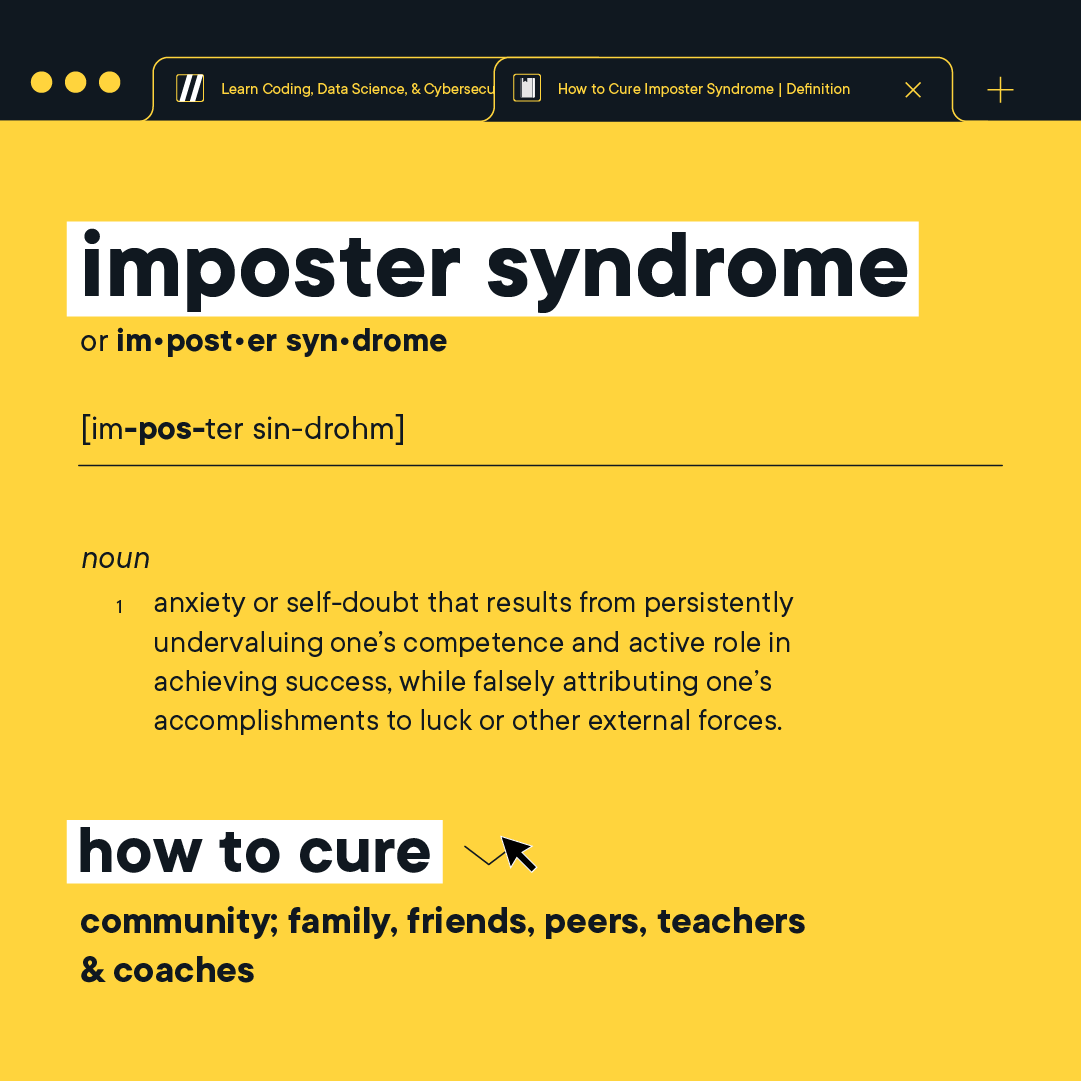Have you ever felt like you’re not good enough? Not a real writer? Not creative enough? Well, there’s a name for that. Imposter syndrome is at the root of these self-doubts, and can often leave people wondering…
-
Is this even good enough?
-
What if they realize that I actually don’t know anything?
-
Do I even know what I am really doing?
-
Am I smart enough to even be here?
-
I need my project to be perfect or they may find out I rarely know anything.
The fear of being exposed as a ‘fraud’ has stopped many job seekers from applying to jobs — and often jobs they’re more than qualified for. At Flatiron School, we often hear people learning to code or learning data science question if they're cut out for the job. Yet, almost always, the answer is yes.
Even as a career coach, it’s not uncommon for me to say these things to myself before catching them, too. In my time as a career coach and through a whole lot of research around imposter syndrome, I’ve realized a few helpful ways to overcome imposter syndrome — so you can get past the fear and fulfill your ambitions.

What is imposter syndrome?
Although the term ‘imposter syndrome’ is not recognized as a psychiatric disorder, the term itself is commonly used and widely discussed.
Here are some common signs of imposter syndrome:
-
Lack of self-confidence in your position
-
Constant feeling of inadequacy regardless of previous success
-
Comparing yourself to others
-
Continual negative self talk — “I don’t know enough,” or I’m not capable because of not having a degree [or insert statement here]
-
Irrational fears of the job application or interview
Personally, my first experience of imposter syndrome is when I worked for a Fortune 500 company right after university as a manager. I didn't have a solid professional year of working experience and I certainly didn’t have a master’s degree. I did know, though, that whatever came my way was going to be a learning experience for my career.
Does Imposter syndrome impact women more?
The reality is that imposter syndrome impacts everyone in some shape or form.
However, according to Brian Daniel Norton, a psychotherapist and executive coach in New York, he states, “Women, women of color, especially black women, as well as the LGBTQ community are most at risk.”
Why does imposter syndrome impact women more than men?
Part of this is because of representation.
These specific demographics don't see many examples of people who look like them or share similar backgrounds in positions these individuals want to be in.
Unfortunately, the lack of role models for marginalized communities has a crucial influence on making people feel like they do — or don't — belong in these corporate environments.
"Without this representation, there's no ‘signal of the possibility of advancement’ or how they managed the realities of stereotypes, stigma and oppression in order to advance," says Thema Bryant-Davis, a psychologist and professor at Pepperdine University.
Physical representation is simply just one of the factors that feeds into a feeling of inadequacy and imposter syndrome.
Women have been commonly stereotyped to be too emotional for leadership positions. Moreover, even the traditional focus on female beauty can impact self-doubt and lack of ability.
Although there is not concrete statistical data, imposter syndrome can also lead women to take on a lower salary. When surveyed, women predominantly believe "not asking for their worth" is the reason for the wage gap. Perhaps the reason for this predicament is because women lack the confidence when starting a new position compared to their male counterparts.
How do I overcome imposter syndrome?
1. Acknowledge and identify the feelings that might be causing your imposter syndrome
It starts with your thoughts and beliefs.
Start with your mind. What you believe is what you will portray. In other words, figure out why you feel the way you do.
"What specific tasks do I think I cannot do in this position?"
What is making you feel like an imposter? Is it because you don't have “10+” experience? Is it because you don't know everything in your field? Or is it because you think everyone knows more than you?
Identify the exact feelings and acknowledge them.
Ask the question, "What is the benefit I am gaining from holding onto this belief?" Perhaps it is because if you don’t apply for that job, you know that you don’t have to talk about the lack of experience that you have which results in feeling not adequate for the job itself.
Once you acknowledge these feelings, then there is an opportunity to make a different choice. What people don't realize is that we get to choose our feelings and redirect them in a more positive way. How can you turn it into an opportunity to help you grow in your career?
For example, if someone feels like their resume is lacking, then the next question should be asked, "What can I do to create a resume that demonstrates I am a standout candidate?"
Consequently, ask an empowering question that leads to a better answer. Being able to flip the switch allows a person to take control of the emotional rollercoaster instead of the emotions controlling them.
2. Find and work with a coach
Imposter syndrome can sometimes be difficult to recognize in oneself.
More often than not, we are swimming in our own doubt. This can cause a downward spiral that severely stunts professional progress.
Any time you notice yourself thinking consistent negative thoughts, you might benefit from working with a coach.
A coach can help you achieve your personal and professional goals, keep you accountable, help you see what you can't see, and speak truth. A coach can help you jump leaps and bounds forward instead of your mind bringing you back to where you don't want to go.
Coaches and mentors are invaluable.
3. Realize no one has all the knowledge (no one knows absolutely everything)
One student of mine has stated, "I just want to know everything." The truth is, that’s unrealistic. Even if we did know everything about a subject, the world is always changing. In addition, even if you knew a subject in detail, there's always something new to learn from someone else.
Similarly, keeping up to date with the latest trends, regardless of your field, will help with your credibility in your specific industry. It’ll also help you build confidence.
Remember, start where you're at and enjoy the journey.
4. You're not alone
There are different imposter syndrome archetypes. What you need to know is that you're not alone. In fact, an estimated 70% of the population deal with feelings of inadequacy.
Shockingly, these feelings are more common than not, yet many don't speak about them.
One of the ways to combat this isolation and loneliness is to build community. Find a group of people who are pursuing the same outcome as you are and share ideas, insights, successes, and failures.
Again, acknowledge the feelings of imposter syndrome with others and help each other surpass the mental block.
5. Embrace your fear
Use your fear of inadequacy as fuel. Ask yourself, “What’s the worst that could happen?” If you get rejected from a job, at least you tried. If you receive an acceptance of a job, at least you tried. Any movement towards what we want is better than no progress at all.
Secondly, when you're transitioning into an entry-level position, most likely you're not going to know a lot of things. And guess what? It's more than okay. Remind yourself that everyone with more experience than you started exactly in the same place you are right now.
Unsurprisingly, prominent people can often feel like imposters even if they are highly experienced. Embrace feeling uncomfortable and utilize this time to soak up the knowledge around you.
6. Be kind to yourself
First of all, we feel like frauds at times because we are unable to internalize and recognize our own achievements and successes in life.
HubSpot marketing manager Lindsay Kolovish Cox, in her great article for combatting imposter syndrome, advises to, "Take the pressure off yourself and stop trying to be the expert on day one."
The truth is there is always something new to learn in our profession!
Negative self-talk is common, yet this bad habit can hinder you and cause unnecessary stress, anxiety, and, quite frankly, low self-esteem.
Lastly, create an ongoing list of positive things that others have said about you as well as your own internal achievements. The point here is to demonstrate that what we have done in our lives (big or small) counts and is part of what makes us different from others.
7. Look at other’s successes as possibilities and focus on what is possible for you
There comes a time where comparing ourselves to others can be very damaging. Using the lives of others and achievements of others can immediately diminish your own accomplishments and trigger instant jealousy. We’ve heard about this with social media, and the same rings true here.
Many people will achieve something before you do or land their dream job before you do. Celebrate others' successes because it only demonstrates that it is possible for you, too.
Focus on what is possible for you, one step at a time. Do you want to eventually be a team lead? Do you see yourself taking on new and innovative projects? Did you find yourself a new volunteer opportunity to share your skills?
What one focuses on is what expands. If you are continually being worried about the lack of knowledge you have, you will continue to feel that way. You get to have a choice of where you navigate your feelings and what you spend time thinking on.

8. Visualize success
The majority of top athletes are trained to visualize their goals right before a competition. Trainers help these athletes build moments of success as well as building mental triggers for the perfect match, race, or game.
How do you use visualization to achieve your goals?
Decide what you want to happen
What you focus on, grows. Instead of focusing on what you don't want or lack, focus on what you do want to happen.
Imagine the ideal scenario
Do you want to ace that interview? Picture yourself doing well in the interview. Include what it would sound like, what it would feel like, and what would it be like?
Visualize daily
Be consistent and spend a few minutes of your day with this ideal scenario. It's essential to prime your brain to make it believe that it's actually the truth. Playing the visualization over and over again in your head will start to feel real and when that interview actually comes, it will feel as if it already happened before.
What can bosses and leaders do to keep their employees from feeling Imposter Syndrome?
Foster psychological safety
First of all, normalize imposter syndrome. It's not a foreign term and in fact, sharing any insights with your employees will bring a sense of trust and reliability right off the bat. Provide opportunities to have open discussions about fear of failure and self-doubt. Share the idea that we must fail forward to create growth. Normalize the fear of taking risks and the fear that comes with it. Cultivate a space where employees can trust you even if they're doubting themselves.
Recognize people’s accomplishments
The best way to build a collaborative and growing team is constructive and uplifting feedback. Remember, how you deliver it is just as important what you deliver. Allowing all team members to provide feedback demonstrates their voices matter. Furthermore, it helps expectations be understood and help contributors feel safe that their opinions matter and are heard.
Don't forget to celebrate the little wins. Support your team by taking note of their strengths. Recognition can go a long way and allow others to be seen a valuable asset in the company.
Create a culture of inclusion
-
More than ever, it’s important to create a culture of inclusion for underrepresented groups. This can be done by:
-
Educational Opportunities
-
Turn lunch hour in a learning opportunity into someone's culture or traditions.
-
Develop a multicultural calendar
-
Provide dates on the calendar that highlight special holidays and events.
-
Open door policy
-
This can be done by setting communication ground rules, like: No interruptions, giving everyone equal time to speak, and acknowledging mistakes as well as wins.
-
Create your own tradition
-
Come together as a team and cultivate traditions within the office or online. For example, creating teams within departments and having a quarter quiz about one’s culture.




